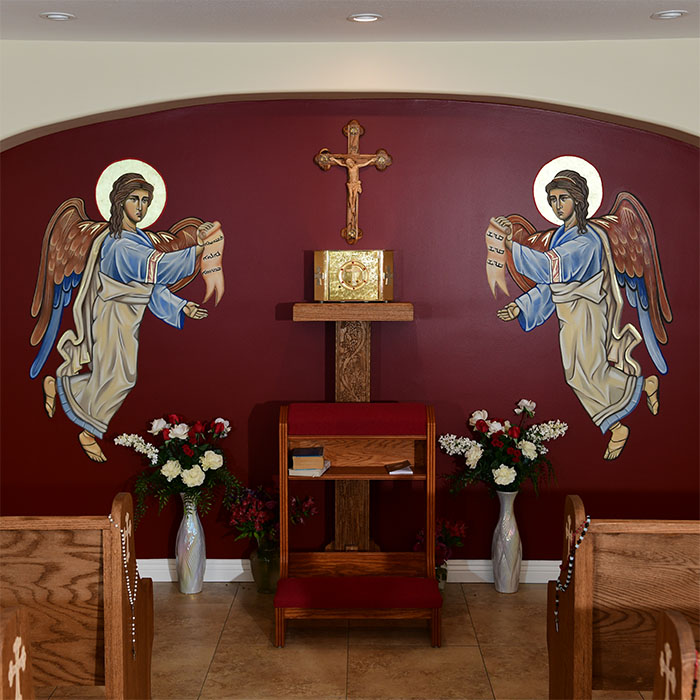St. Michael’s Chaldean Catholic Church
Eucharistic Adoration

Eucharistic Adoration: Deepening Your Spiritual Connection
1. What is Eucharistic Adoration?
Eucharistic Adoration is a profoundly sacred practice within the Catholic tradition where the consecrated Host, the Body of Christ, is placed in a monstrance for worship and contemplation.
It provides a unique opportunity for believers to engage in silent prayer, meditation, and adoration in the presence of the Blessed Sacrament. During this intimate encounter, Catholics spiritual connection.
2. Why is Eucharistic Adoration Important?
Eucharistic Adoration holds significant spiritual and personal importance for Catholics. It allows for a direct encounter with Christ, transcending the boundaries of time and space. Through this practice, believers can:
Deepen Relationship with Christ:
Eucharistic Adoration provides a special environment to establish a personal and intimate relationship with Jesus. By spending time in His presence, individuals can open their hearts, share their concerns, and find solace in His unwavering love.
Contemplative Reflection:
Amid the hustle and bustle of daily life, Eucharistic Adoration offers a tranquil setting to reflect on one’s faith journey, seek guidance, and find answers to life’s questions through prayerful contemplation.
Spiritual Nourishment:
Just as physical food nourishes the body, the spiritual nourishment received through Eucharistic Adoration strengthens the soul. It brings a sense of renewal, peace, and a deepening understanding of the mystery of the Eucharist.
Transformation and Holiness:
Regular adoration can lead to personal transformation, helping individuals grow in holiness and aligning their lives more closely with Christ’s teachings. It is a time for self-examination, repentance, and renewal of commitment to Christian values.
3. Why Be Respectful in the Adoration Chapel?
Respectful behavior in the Adoration Chapel is essential to honor the sanctity of the space and the reverence due to the Eucharist. Being respectful includes:
Silence and Reverence:
Adoration chapels are places of quiet prayer and reflection. Maintain a respectful silence, avoiding unnecessary noise or distractions that could disrupt the contemplative atmosphere.
Modesty in Attire:
Dress modestly and appropriately, acknowledging the sacred nature of the space and the solemnity of the occasion.
Proper Posture:
While sitting or kneeling, maintain a reverent posture. It signifies your openness to encountering Christ and communicates your devotion.
No Electronic Devices:
Switch off or silence electronic devices to prevent distractions and to fully engage in prayerful reflection.
No Eating or Drinking:
Refrain from consuming food or drinks within the Adoration Chapel to preserve the sacred atmosphere.
Adherence to Guidelines:
Follow any specific guidelines set by the parish or chapel for the respectful conduct of Eucharistic Adoration.
Eucharistic Adoration offers a profound opportunity to draw closer to Christ and experience His presence in a deeply meaningful way. By embracing a spirit of reverence and respect, believers can fully immerse themselves in this transformative practice and cultivate a deeper spiritual connection with the Eucharistic Lord.
Eucharistic Holy Hour: A Guide to Preparation and Participation
A Eucharistic Holy Hour is a sacred and intimate time of prayer and contemplation before the Blessed Sacrament. It provides a unique opportunity for Catholics to deepen their relationship with Christ and experience His presence in a profound way. Proper preparation and thoughtful participation enhance the spiritual richness of this devotion. Here’s a guide on what a Catholic can do during a Eucharistic Holy Hour and how to best prepare:
Preparation:
1. Intention Setting:
Begin by setting a clear intention for your Holy Hour. Reflect on what you hope to gain from this time with Christ—whether it’s seeking guidance, offering thanksgiving, or praying for specific needs.
2. Quiet Your Heart:
Approach the Holy Hour with a calm and open heart. Spend a few moments in silence, centering yourself and leaving behind the distractions of the world.
3. Scripture and Reflection:
Bring a Bible or a prayer book to aid in your reflections. Choose a passage from the Gospels or a spiritual reading that resonates with your intention. Ponder its meaning and how it applies to your life.
4. Prayerful Offerings:
Bring your joys, concerns, and struggles to the Lord. Offer prayers of gratitude, intercession, and supplication. Speak to Jesus as you would to a dear friend, sharing your heart honestly and openly.
During the Holy Hour:
1. Silent Adoration:
Spend time in silent adoration, simply being in the presence of Christ. Kneel or sit reverently, gazing upon the Blessed Sacrament. Allow the silence to create space for communion with the Lord.
2. Meditation and Reflection:
Contemplate the mysteries of Christ’s life, death, and resurrection. Imagine yourself walking beside Him during significant moments, and consider how His experiences relate to your own journey.
3. Conversational Prayer:
Engage in a heartfelt conversation with Jesus. Share your thoughts, hopes, and fears. Express your love and gratitude, and listen for His gentle guidance through the whispers of your heart.
4. Spiritual Reading:
Read from the Scriptures or a spiritual book. Let the words inspire deeper contemplation and understanding of Christ’s teachings and His immense love for humanity.
5. Offer the Rosary or Divine Mercy Chaplet:
Incorporate these traditional devotions into your Holy Hour, focusing on the mysteries of Christ’s life, death, and resurrection, or seeking His mercy and compassion.


Closing and Reflection
1. Thanksgiving:
As your Holy Hour comes to an end, express gratitude to Jesus for His presence and the opportunity to spend this sacred time with Him.
2. Petitions and Surrender:
Offer any unspoken prayers or intentions to Christ, trusting in His providence and care.
3. Renewed Commitment:
Before leaving, recommit yourself to living out the insights and graces you received during the Holy Hour. Seek to carry the peace and presence of Christ into your daily life.
A Eucharistic Holy Hour is a profound way to draw closer to Jesus and experience His boundless love. By preparing thoughtfully and participating with reverence, Catholics can enrich their spiritual lives and cultivate a deeper connection with the Eucharistic Lord.
